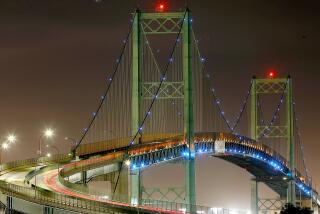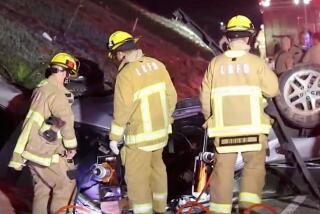Radio Show Jams Traffic on Ventura Freeway
- Share via
Ventura Freeway commuters were mired in a 15-mile traffic jam Tuesday when a popular morning radio show, which included a promotion for a Caltrans plan to make freeway traffic flow more smoothly, was broadcast from an Encino overpass, authorities said.
Traffic that passed beneath the KIIS AM-FM motor home on the Louise Avenue overpass was reduced to an aggravating, stop-and-go crawl while many motorists slowed to gawk or compete for $100 bills.
The backup resulted in hundreds of complaints from angry motorists, many phoning from cars in the traffic jam, to Caltrans, the California Highway Patrol, KIIS and Los Angeles City Councilwoman Joy Picus’ office.
The 6 a.m. to 10 a.m. radio show with disc jockey Rick Dees had received a Caltrans permit to broadcast from the overpass, and a Caltrans official was even interviewed during the show about a ride-sharing program.
Permit Revoked
But the agency yanked the permit after complaints began pouring in, and officials learned that KIIS was using a larger vehicle than permitted and that Dees was attempting to get freeway motorists to respond to the broadcast. The permit revocation, however, did not come in time to end the show or the rush-hour traffic problems.
During the show, Dees gave away free strawberries, doughnuts and bumper stickers to motorists on the overpass. He also broadcast descriptions of cars driving on the freeway below and urged the drivers, if they were listening, to exit the freeway and come up to the mobile unit to collect $100 prizes.
Drivers and passengers on the freeway tried antics ranging from unfurling banners to holding legs through windows and dogs through open sunroofs to get the disc jockey’s attention.
Ron Butcher, a photographer who lives in West Hills and works in downtown Los Angeles, said his commute Tuesday was 30 minutes longer than the usual hour because of the radio show.
‘Blink Your Lights’
“Rick Dees would say, ‘I see a 1973 Cadillac coming toward us,”’ Butcher said. “He would say, ‘Blink your lights if you hear me . . . you’re going to get a crisp new $100 bill.’ So the guy would cut across all the lanes. Cars would be screeching. . . . Everybody was riding their brakes and turning their lights on. It was incredible. It was a zoo.”
The California Highway Patrol said the spectacle caused eastbound traffic to back up 15 miles through Calabasas and westbound traffic to back up to the San Diego Freeway. Louise Avenue was also snarled in traffic. A crowd of people who had left their cars also gathered around the radio station’s motor home to watch Dees and try to win prizes.
CHP officials said there were no accidents but many angry commuters.
“We were inundated with calls throughout the morning from angry motorists,” CHP Officer Jill Angel said. “The decision to allow it was Caltrans’. When we found out about it we were not in agreement because we knew what traffic problems could develop. But the permit had already been allowed.”
The overpass broadcast included a promotion for a Caltrans van-pooling program designed to reduce traffic while a widening project on the Ventura Freeway is under way. Margaret Moilov, an associate transportation planner for Caltrans, was interviewed.
The promotion prompted Bill Keene, a traffic reporter for KNX Newsradio, to tell his audience, “This does for van pools what W.C. Fields did for sobriety.”
“Needless to say this is not going to happen again,” said Caltrans spokesman Presley Burroughs. “Response has been extremely negative. People were sitting in their cars unable to get to work.”
Or school. At the 300-student Egremont School on Louise Avenue by the overpass, so many students were coming in late that officials had to delay by an hour the start of tests scheduled for some students.
Burroughs said Caltrans had issued the radio station an “encroachment permit” to broadcast from the overpass but that the permit was for a van, which Caltrans officials believed would not distract motorists on the freeway.
“The permit was for a van,” Burroughs said. “Instead, they put up a 30-foot motor home with a 25-foot antenna with a three-foot dish on top of it. We yanked the permit and asked CHP to remove them.”
But the permit wasn’t pulled until 8:45 a.m. and by the time the order to remove the motor home from the overpass was relayed to the CHP and then to officers on patrol, it was too late.
“By the time we got there it was a moot point,” Sgt. Dane Hayward said. “The show was ending.”
Officials from the Hollywood-based radio station downplayed the traffic snarl and said there were more positive than negative calls to the station.
“We were invited by Caltrans,” said Karen Tobin, director of marketing for the station. “We worked together on it. We abided by all restrictions. This wasn’t done in five seconds. Louise was picked because it was not a major overpass.”
Burroughs said the broadcast was not a joint effort between Caltrans and the station. He said Caltrans was unaware that Dees would be asking motorists on the freeway to exit or in any way respond to the broadcast.
“This was not a stunt to promote ride-sharing,” Burroughs said.
For some, the ire caused by the broadcast lasted well after the motor home left the overpass. For others, there was happiness and money.
Brian Ozur and Ryan Heller, both high school students from Tarzana, said they made at least four passes under the mobile unit, waving a pink towel out of the sunroof of their car, before Dees noticed them and awarded them $100.
“We’re going to use it on a limo for the prom,” Ozur said.
But Picus, who short-circuited the traffic tie-up by taking Ventura Boulevard instead of the freeway on her way downtown, said she will introduce a motion in City Council to urge Caltrans to “desist from issuing permits to broadcast from freeway overpasses during rush hour or at other times when traffic may be disrupted.”
“Plainly, permission should never have been granted and should not be granted again, because to deliberately cause that kind of traffic jam is absurd,” Picus said. “This frivolous, avoidable disturbance created countless hours of delay for commuters, wasted hundreds of gallons of motor fuel, spewed tons of pollutants into the air and caused enormous stress for motorists trapped in their cars, late for work or appointments.”
Times Staff Writers Richard Simon and Amy Pyle contributed to this report.
More to Read
Sign up for Essential California
The most important California stories and recommendations in your inbox every morning.
You may occasionally receive promotional content from the Los Angeles Times.













